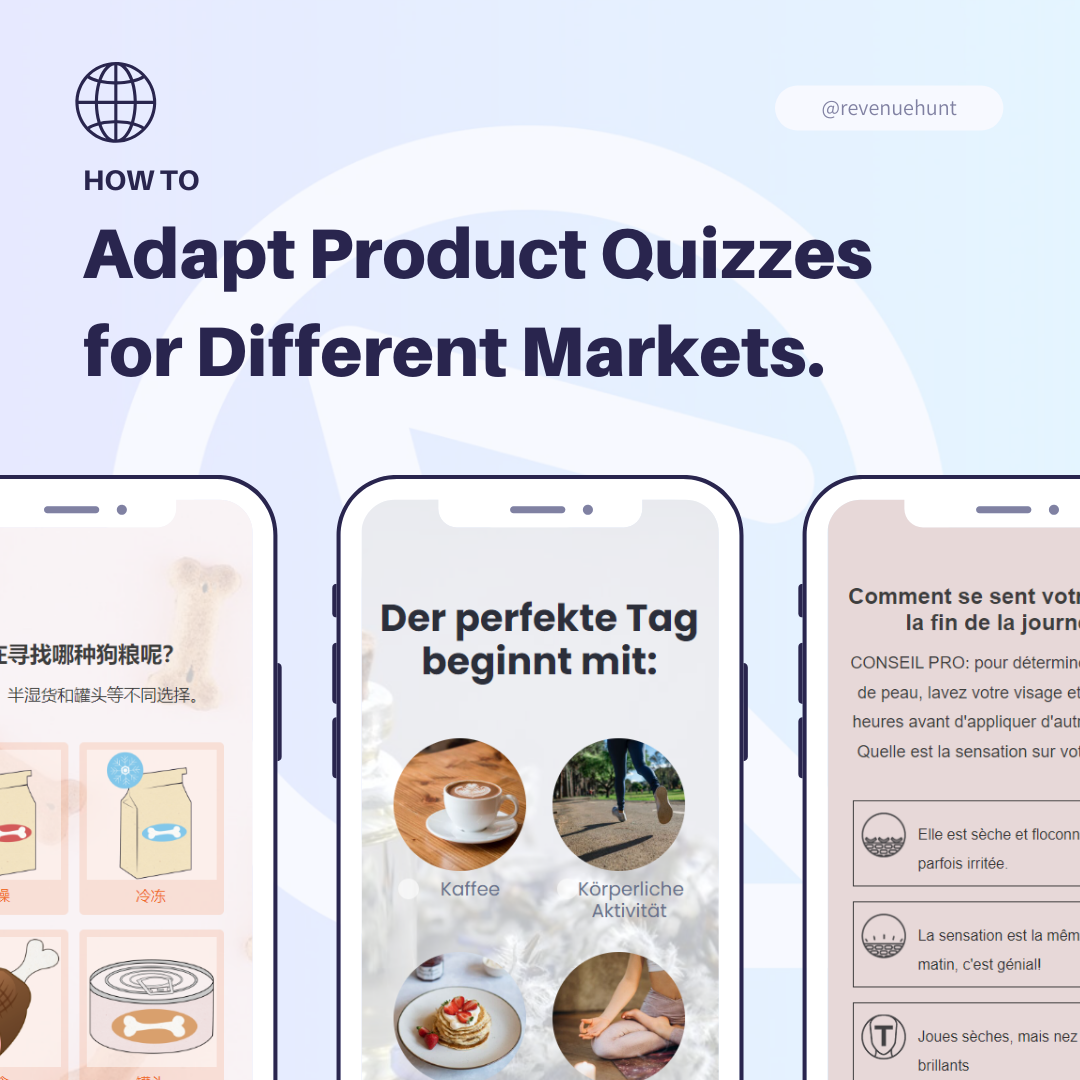Adapt Product Quizzes for Different Markets and Languages¶
When a shopper lands on your store, they instantly notice two things:
Does this feel made for me? and Can I trust it?

If your quiz greets a French customer in English, shows dollars instead of euros, or asks questions that feel out of place in their culture, you lose that moment of connection.
Adapting your quizzes for different markets and languages is not just a technical detail — it’s a way of saying you belong here.
The Case for Localization¶
Think of your quiz as a digital salesperson.
A good salesperson doesn’t speak the same script to everyone — they adapt depending on who’s in front of them.
- In Spain, friendliness and warmth can make people more comfortable sharing information.
-
In Germany, clarity and compliance cues (like showing “per 100ml” pricing) reassure customers that your brand is professional.
Tip: Product Metafields
To show the “grundpreis” or
per 100mlprice for cosmetic products RevenueHunt app allows you to show these values by automatically syncing the metafields/attributes of products from your store. -
In the US, speed and incentives (“Take this 45-second quiz for 10% off”) tend to drive engagement.
The same quiz, copied and pasted across all markets, misses those nuances. A localized quiz, on the other hand, feels natural — and customers reward that effort with higher engagement and stronger conversions.
Shopify Markets Support
The 💎 Built for Shopify version of the RevenueHunt app fully supports the Shopify Markets feature allowing you to assign quizzes to different markets and languages quickly and easily.
Check our step by step tutorial on how to set up Shopify Markets and assign quizzes to different markets and languages with the RevenueHunt app: Assign Quizzes to Shopify Markets and Languages.

What Changes When You Localize¶
Localization isn’t just swapping languages. It touches multiple layers of the experience:
Language and tone. A casual “Hey, let’s find your skincare match” might resonate in the US, while a more polished tone may feel appropriate in Japan.
Visuals. Even colors carry meaning. Red signals good fortune in China but can imply danger in Western markets.
Currency and pricing. Showing euros to a German customer instead of USD removes an instant layer of friction.
Legal requirements. Some regions enforce very specific rules — like GDPR consent in Europe or advertising standards in Canada.
Together, these details tell your customers: we understand you, and we built this experience for you.
The Business Payoff¶
Brands that localize their quizzes consistently see three wins:
- More completed quizzes. People stick with what feels familiar and relevant.
- Higher conversions. Clear pricing and tailored recommendations reduce hesitation.
- Deeper customer loyalty. When someone feels seen, they’re far more likely to come back.
And there’s a side benefit: you gather better data. Localized quizzes reveal what customers in France care about versus what drives decisions in Australia. That’s market research you can act on.
Tips for a Smooth Rollout¶
Check our tutorial
If you want the technical “how-to” on assigning quizzes to Shopify Markets, we’ve got you covered here:
👉 Tutorial: Assign Quizzes to Shopify Markets and Languages
Start small. Choose your top two or three markets, duplicate your best-performing quiz, and adapt it. Don’t try to cover the globe in one sprint.
Keep branding consistent. Customers should recognize your brand instantly, even if the tone shifts slightly to match local expectations.
Test in the wild. The in-app preview won’t show market differences, so you’ll need to publish and actually change your store region or language to see what customers see.
Plan for upkeep. Quizzes aren’t “set and forget.” Product lines evolve, translations need polishing, and regulations shift. Build localization into your ongoing operations, not as a one-off project.
A localized quiz does more than recommend products. It builds trust across borders, increases conversions, and turns your store into a brand that feels truly global.
But remember: the real success lies not in the setup, but in the mindset. Localization is the difference between saying we sell everywhere and we care everywhere.